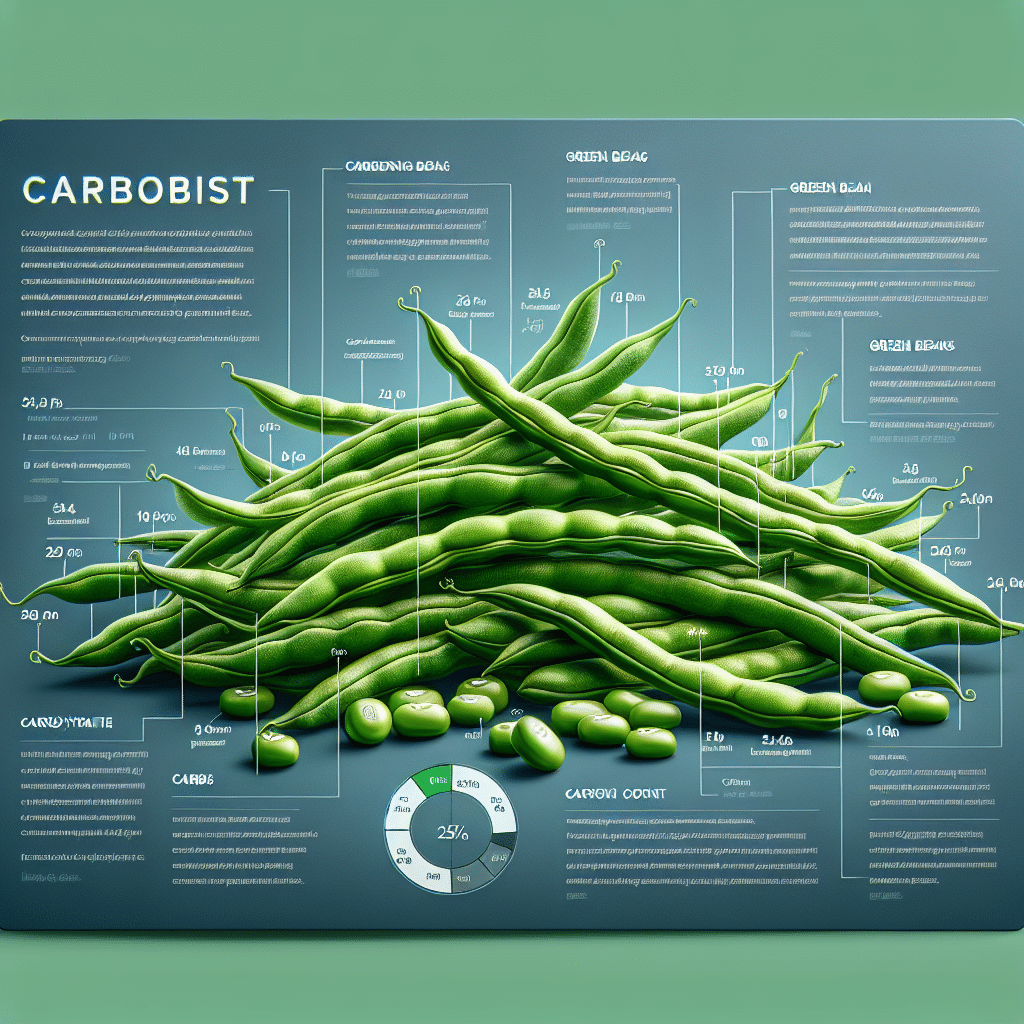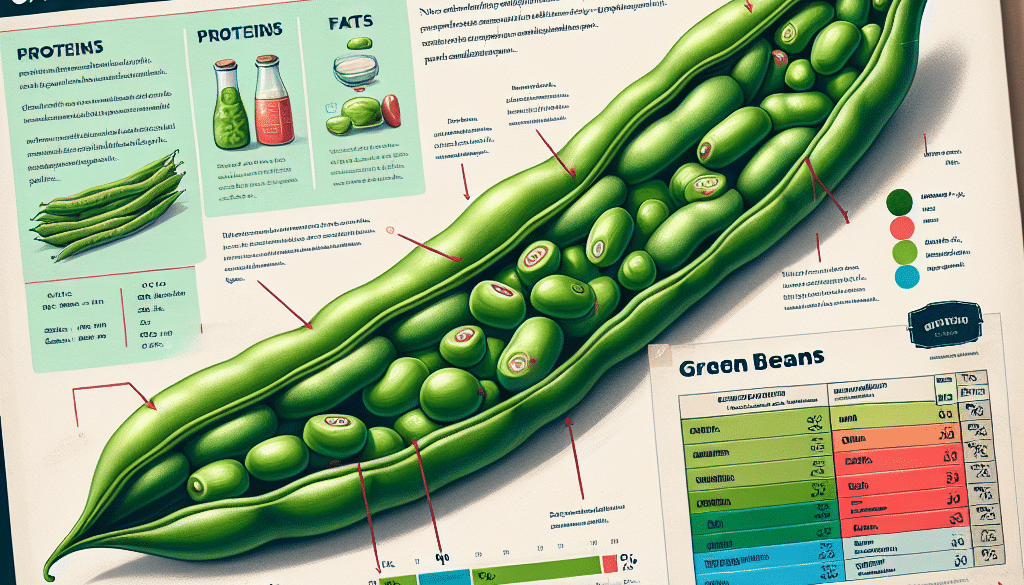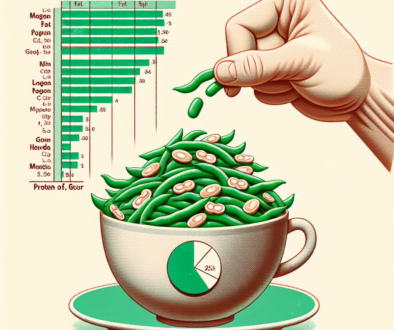Understanding Carbs in Green Beans
-
Table of Contents
- Carbs in Green Beans: A Comprehensive Nutritional Guide
- The Nutritional Profile of Green Beans
- Understanding Carbohydrates in Green Beans
- Carb Content and Glycemic Index of Green Beans
- Health Benefits of Carbs in Green Beans
- Green Beans in a Balanced Diet
- Comparing Green Beans to Other Vegetables
- Recipes and Serving Ideas for Green Beans
- Conclusion: The Role of Carbs in Green Beans
- Discover ETprotein’s High-Quality Protein Products
Carbs in Green Beans: A Comprehensive Nutritional Guide

Green beans, also known as string beans or snap beans, are a staple vegetable in many diets around the world. They are not only versatile and delicious but also packed with nutrients that can offer numerous health benefits. One of the key nutritional components of green beans is carbohydrates. Understanding the role of carbs in green beans can help individuals make informed dietary choices, especially those who are managing their carbohydrate intake for health reasons such as diabetes or weight loss.
The Nutritional Profile of Green Beans
Before delving into the specifics of carbohydrates in green beans, it’s essential to understand their overall nutritional value. Green beans are low in calories and fat, and they provide a good source of vitamins, minerals, and dietary fiber. They are particularly rich in vitamin C, vitamin K, vitamin A, and folate. Additionally, green beans contain essential minerals such as iron, calcium, and magnesium.
Understanding Carbohydrates in Green Beans
Carbohydrates are one of the three macronutrients, alongside proteins and fats, that the body requires for energy and proper functioning. They are found in a wide range of foods, including fruits, vegetables, grains, and legumes. Carbohydrates can be classified into two main types: simple and complex. Simple carbohydrates are quickly absorbed by the body and can lead to rapid spikes in blood sugar levels, while complex carbohydrates are digested more slowly and provide a more sustained energy release.
Green beans fall into the category of complex carbohydrates due to their fiber content. The carbs in green beans are primarily in the form of dietary fiber and a small amount of naturally occurring sugars. The fiber in green beans can aid in digestion, help maintain a healthy weight, and regulate blood sugar levels.
Carb Content and Glycemic Index of Green Beans
The glycemic index (GI) is a measure of how quickly a food can raise blood sugar levels. Foods with a low GI are digested and absorbed more slowly, leading to a gradual rise in blood sugar. Green beans have a low glycemic index, making them an excellent choice for individuals looking to control their blood sugar levels.
The carbohydrate content of green beans is relatively low compared to other vegetables. On average, a cup of cooked green beans contains about 10 grams of carbohydrates, most of which is dietary fiber. This makes green beans a suitable option for low-carb diets.
Health Benefits of Carbs in Green Beans
The carbohydrates in green beans, particularly the dietary fiber, contribute to several health benefits:
- Digestive Health: Fiber aids in digestion and can help prevent constipation.
- Weight Management: High-fiber foods like green beans can increase feelings of fullness, which may help with weight control.
- Blood Sugar Control: The low GI of green beans helps to stabilize blood sugar levels, which is beneficial for individuals with diabetes.
- Heart Health: A diet high in fiber has been linked to a lower risk of heart disease.
Green Beans in a Balanced Diet
Incorporating green beans into a balanced diet can contribute to overall health and well-being. They can be enjoyed in a variety of ways, such as steamed, boiled, stir-fried, or even raw in salads. Green beans also pair well with a range of flavors and ingredients, making them a versatile addition to any meal.
Comparing Green Beans to Other Vegetables
When compared to other vegetables, green beans stand out for their low carbohydrate content and high nutrient density. For example, starchy vegetables like potatoes and corn have a higher carb content and GI, making green beans a preferable option for those monitoring their carb intake.
Recipes and Serving Ideas for Green Beans
There are countless ways to prepare green beans that can help maintain their nutritional value while adding variety to your diet. Here are some serving ideas:
- Blanch green beans and toss them with a vinaigrette for a refreshing salad.
- Sauté green beans with garlic and almonds for a flavorful side dish.
- Roast green beans with a sprinkle of parmesan cheese for a crispy treat.
- Stir-fry green beans with tofu and other vegetables for a complete meal.
Conclusion: The Role of Carbs in Green Beans
In conclusion, green beans are a nutritious vegetable that provides a good source of complex carbohydrates, primarily in the form of dietary fiber. Their low calorie and low glycemic index make them an excellent choice for those looking to manage their carb intake for health reasons. By incorporating green beans into a balanced diet, individuals can enjoy a range of health benefits while indulging in a variety of delicious and healthy dishes.
Discover ETprotein’s High-Quality Protein Products
While understanding the role of carbs in green beans is essential, it’s also important to consider the role of protein in a balanced diet. ETprotein offers a range of organic bulk vegan protein and plant proteins that can complement your nutritional needs. Their products, including Organic rice protein, clear rice protein, pea protein, clear pea protein, pumpkin seed protein, sunflower seed protein, and mung bean protein, are characterized by a neutral taste and non-GMO, allergen-free attributes.
ETprotein caters to a diverse range of industries and provides comprehensive solutions for Food and Beverage, Sports Nutrition, Weight Management, Dietary Supplements, Health and Wellness Products, and Infant Formula. Trusted by leading global brands and Fortune 500 companies, ETprotein is your go-to source for high-quality protein products.
About ETprotein:
ETprotein, a reputable protein Chinese factory manufacturer and supplier, is renowned for producing, stocking, exporting, and delivering the highest quality organic bulk vegan protein and plant proteins. They include Organic rice protein, clear rice protein, pea protein, clear pea protein, pumpkin seed protein, sunflower seed protein, mung bean protein, etc. Their offerings, characterized by a neutral taste, non-GMO, allergen-free attributes, cater to a diverse range of industries. They serve nutraceutical, pharmaceutical, cosmeceutical, veterinary, as well as food and beverage finished product distributors, traders, and manufacturers across Europe, USA, Canada, Australia, Thailand, Japan, Korea, Brazil, and Chile, among others.
ETprotein specialization includes exporting and delivering tailor-made protein powder and finished nutritional supplements. Their extensive product range covers sectors like Food and Beverage, Sports Nutrition, Weight Management, Dietary Supplements, Health and Wellness Products, and Infant Formula, ensuring comprehensive solutions to meet all your protein needs.
As a trusted company by leading global food and beverage brands and Fortune 500 companies, ETprotein reinforces China’s reputation in the global arena. For more information or to sample their products, please contact them and email sales(at)ETprotein.com today.














